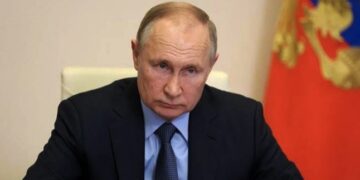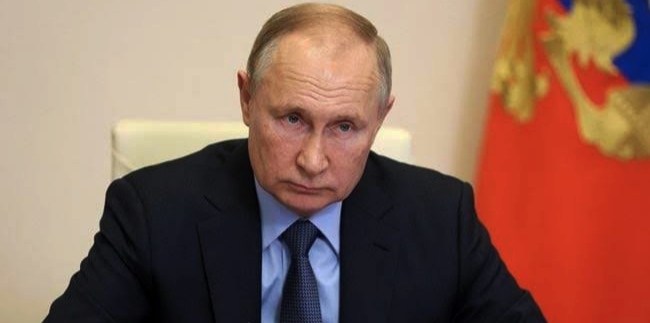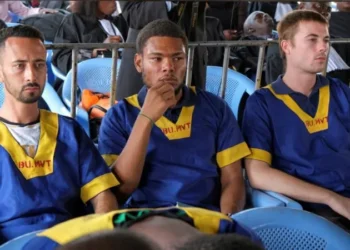By John Ikani
US President, Joe Biden has announced a fresh set of “full blocking sanctions” against Moscow, following Russian President Vladimir Putin’s recognition of two Ukrainian regions as independent states and order of Russian forces into eastern Ukraine.
Heritage Times earlier reported that Putin’s recognized Luhansk and Donetsk, two regions controlled by Russian-backed separatists, as independent states and also ordered Russia to move into these areas to perform “peacekeeping functions.”
Biden on Tuesday announced what he called the “first tranche” of sanctions, which will include full blocking sanctions on two Russian financial institutions and penalties on Russian sovereign debt, designed to cut Russia off from foreign financing. Biden said sanctions on Russian elites and their families would follow.
The sanctions announced so far by Biden are forceful signals that target certain financial institutions and individuals — but they are not yet the most severe sanctions the West has the capability to impose.
In a brief address from the White House, Biden accused Putin of flagrantly violating international law in what he called the “beginning of a Russian invasion of Ukraine,” and promised that more sanctions would be coming if Putin proceeds further.
The United States’ measures come after Europe and the United Kingdom also imposed sanctions on Russia, including asset freezes and travel bans for certain Russian oligarchs and politicians.
Germany also paused certification for the $11 billion Nord Stream 2 pipeline, something the US and many of its partners very much wanted.
The US a day earlier placed targeted sanctions on those doing business in the breakaway regions in eastern Ukraine where Russia was moving in.
Australia, Canada and Japan did not spare Russia as they equally announced economic action in reaction to Putin’s latest moves on Ukraine.
When announcing Australia’s sanctions, Prime Minister Scott Morrison said they would include targeted travel bans and financial sanctions against members of Russia’s National Security Council, the Australian Broadcasting Corporation (ABC) reported.
Morrison said broader sanctions would be extended to the separatist-controlled regions and added that he expected to impose more sanctions on Russian citizens seeking to benefit off a Russian invasion of Ukraine.
The Australian prime minister also said that Ukrainian visa applications would be moved to “the top of the pile.”
“The invasion of Ukraine has effectively already begun. This invasion is unjustified, it’s unwarranted, it’s unprovoked and it’s unacceptable,” Morrison said, according to the ABC. “We cant have some suggestion that Russia has some just case here they’re prosecuting — they are behaving like thugs and bullies.”
In a press briefing, Canadian Prime Minister Justin Trudeau called Russia’s actions on Monday a “violation of Russia’s obligations under international law and the charter of the United Nations.”
“Canada also denounces Russian military actions, including orders to move into Ukraine, which is a clear incursion of Ukraine’s sovereignty and territorial integrity. Make no mistake this is a further invasion of a sovereign state and it is completely unacceptable,” Trudeau said.
As part of Canada’s sanctions against Russia, Trudeau announced that all Canadians would be banned from taking part in “financial dealings with the so-called independents states of Luhansk and Donetsk.” Canadians will also be banned from purchasing Russian sovereign debt.
Canada will also be targeting members of Russia’s parliament who voted to recognize Luhansk and Donetsk as well as two state-backed Russian banks.
As Reuters reported, Japanese Prime Minister Fumio Kishida said, “Russia’s actions very clearly damage Ukraine’s sovereignty and go against international law. We once again criticise these moves and strongly urge Russia to return to diplomatic discussions.”
Kishida said Japan’s sanctions would involve prohibiting Russian bonds from being issued in Japan, freezing the bank accounts of certain Russian individuals and restricting travel to Japan. Moscow elites and Russian banks will also be targeted.
The Japanese leader said the details of the sanctions would be worked out and announced over the next few days. He added that Japan’s energy supplies would not be impacted in the short term thanks to sufficient reserves of oil and liquefied natural gas. If energy prices begin to rise, Kishida said he would consider all possible options to prevent an impact on Japanese businesses and households.




































